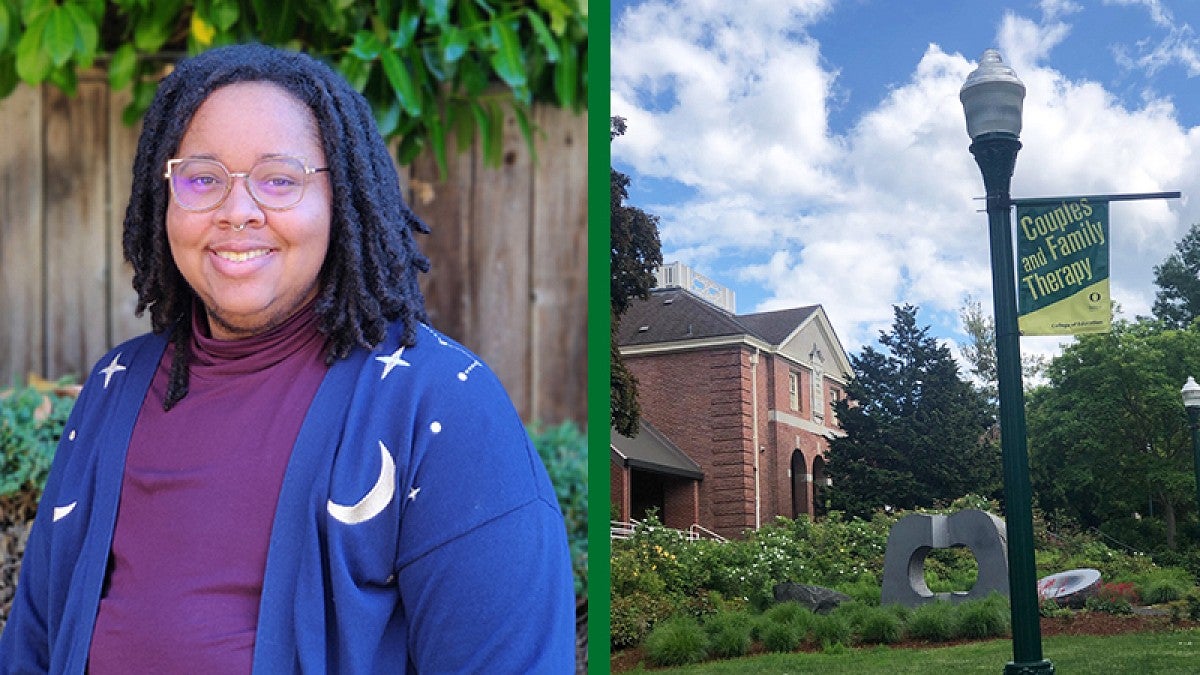Day Hancock-Murphy, a graduate student in the Couples and Family Therapy Program at the College of Education, was awarded the prestigious American Association for Marriage and Family Therapy Minority Fellowship for the upcoming year.
The fellowship, which is funded by the Substance Abuse and Mental Health Services Administration, aims to expand the number of therapists who are culturally informed and who can provide mental health and substance abuse services to underserved and minority populations.
That aligns well with Hancock-Murphy’s goals as a therapist.
“The demographic I’m interested in are people who naturally gravitate to substance abuse and are most disadvantaged,” Hancock-Murphy said. “Because I want to work with not just other LGBTQIA people but also other Black people. There aren’t enough Black therapists. These are typically the populations that get hit hardest by substance abuse.”
Hancock-Murphy, who identifies as transgender and nonbinary and uses the personal pronoun they, found passion in supporting that population when they became involved with their own community in San Diego. For two years, they ran a social space for LGBT+ individuals that deliberately did not involve alcohol or drugs, with a goal of focusing on “building community and resilience,” Hancock-Murphy said.
The experience of creating a safe space made Hancock-Murphy interested in therapy. The College of Education’s Couples and Family Therapy Program, which is social justice-oriented, stood out in their search.
“The program focuses on diversity and looking at people from all different lenses,” Hancock-Murphy said. “The fact is that we live in a society plagued by white supremacy, and marginalized identities are often disadvantaged. To go into a program that held that fact as a baseline for what I’m learning was super-important for me.”
In the two-year Couples and Family Therapy Program, students spend the first year taking classes alongside other students in the program while also gaining experience working as therapy clinicians within the Center for Healthy Relationships. Students see clients, meet with fellow students and are supervised by faculty members.
Hancock-Murphy said the cohort model was immensely helpful in their learning and overall process toward feeling at home in Oregon. Feeling at home was a challenge for Hancock-Murphy during their first term as a student because Oregon is less racially diverse than states Hancock-Murphy had lived in before. Having a built-in community every week during classes made a big difference.
“I am so thankful that the CFT program is a cohort model, because it brings in so many different people from so many different areas,” Hancock-Murphy said. “I’m so thankful because even if there’s stuff I wasn’t expecting, having my cohort to rely on and making what are going to be lifelong friendships has been very nourishing and supportive.”
Hancock-Murphy also found support from faculty and staff at the College of Education. Tiffany Brown,
the clinical director for the Couples and Family Therapy Program, and Jeff Todahl, the Couples and Family Therapy Program director, each teach classes for the cohort and work closely with students. Hancock-Murphy is connected to each of them because Brown is Hancock-Murphy’s adviser and Todahl will more closely supervise Hancock-Murphy as they enter their second year in the program.
Hancock-Murphy’s adviser before Brown, Bertranna Muruthi, most directly encouraged Hancock-Murphy to apply for the fellowship program. Hancock-Murphy said they really needed that support and encouragement to apply because they struggle with imposter syndrome. They were sure when they applied for the fellowship that someone out there might deserve it more.
“But then I got it,” Hancock-Murphy said. “And I was like, ‘What? Wow.’ And once it sunk in, I realized that someone saw me doing this work in this program and they think I deserve it. And I thought, maybe I do really deserve it.”
Because of the fellowship award, Hancock-Murphy will receive a stipend that can be used toward living expenses and other bills. Fellows attend a week-long training institute, participate in seminars, have access to online resources, and will also receive additional mentorship with professionals in the field as they begin to plan their future and doctoral degree.
Hancock-Murphy is still exploring the different options to pursue a doctorate. But as they begin to narrow in on their specialty, they’ve identified an interest in dialectical behavior therapy and narrative therapy, which, when combined, can help individuals process trauma and handle emotions that feel overwhelming. Todahl is supervising Hancock-Murphy next year as they complete independent study on the topic to better serve their clients within the Center for Healthy Relationships.
All of their learning in the Couples and Family Therapy Program, Hancock-Murphy said, is assuring them that they’ve found the right community and career.
“I get up and I work with clients every day. And of course, I’m tired at times,” Hancock-Murphy said. “But I'm also so energized by what I’m doing. I'm just like, ‘How can I be the best therapist I can be? And how can I learn to better help people?’”
—By Madeline Ryan, College of Education


